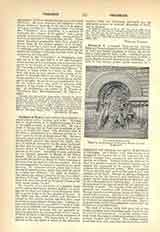

Fredegis of Tours (FRIDUGISUS or FREDEGISUS), a ninth-century monk, teacher, and writer. Fredegis was an Anglo-Saxon, b. in England towards the end of the eighth century; d. at Tours in 834. He was a pupil of Alcuin, first at York and afterwards at the court of Charles the Great. The proximate date of his birth is determined by a reference to him as “a boy” (puer) in a letter of Alcuin dated 798. He was a favorite pupil of Alcuin and was one of the group of distinguished scholars who formed the Schola palatina, in which he was known by the name Nathaniel. At that time he was a deacon. When, in 796, Alcuin became Abbot of Tours Fredegis seems to have remained at the court. According to some authorities he was Alcuin‘s successor as Master of the Palace School. This is, however, improbable. In 804 he succeeded his teacher as Abbot of Tours, retaining at the same time his relations with the emperor. Among his contemporaries he enjoyed a reputation for great learning. He composed several poems and a short treatise in epistolary form, which deals with the nature of nothing and darkness, “De nihilo et tenebris”. The epistle was written probably during the author’s residence at Tours. It is addressed “to all the faithful and to those who dwell in the sacred Palace of the most serene prince Charles”.
The occasion of discussion of a problem which to the modern mind seems childish, namely, Are nothing and darkness real things? was doubtless the Biblical use of the words in the first chapter of Genesis. If the Bible uses the words nothing and darkness, it seemed in that naively realistic age that there must be things corresponding to those words. Fredegis accepts the realistic answer and defends it both by arguments from authority and by arguments from reason. That his solution, however, was not generally accepted is clear from the opening words of the treatise, in which he refers to the long prevailing divergence of opinion in the matter. The importance of the treatise lies in the use which it makes of the dialectical method which was afterwards developed into the scholastic method by Abelard, Alexander of Hales, and St. Thomas.
WILLIAM TURNER

